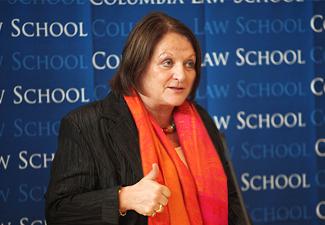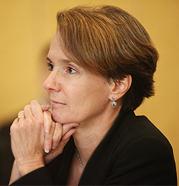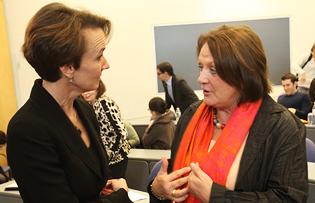Germanys Justice Minister Hails Three European Courts as Shining Stars
Media Contact: Public Affairs, 212-854-2650 or [email protected]
New York, Dec. 2, 2011—The development of Europe’s constitutional law system was the topic of a presentation by German Federal Minister of Justice Sabine Leutheusser-Schnarrenberger. Speaking at Columbia Law School last month, the minister compared the ground-breaking interplay of three constitutional courts in Europe to innovations introduced by the framers of the U.S. Constitution.
“What we are doing in Europe is new, just like what happened in the United States 220 years ago was new,” said Leutheusser-Schnarrenberger. She added that the complementary efforts of the “three shining stars”—the German Constitutional Court, the European Court of Justice in Luxembourg, and the European Court of Human Rights in Strasbourg—constitute a “European invention” for safeguarding human rights.
The presentation was hosted by the European Legal Studies Center, the Columbia Journal of European Law, and the Law School’s chapter of Amnesty International. Leutheusser-Schnarrenberger was joined by a delegation of high-ranking officials from the German ministry that included Busso von Alvensleben, consul general of the Federal Republic of Germany, who is based in New York.
Professor Sarah Cleveland (left), the Louis Henkin Professor in Human and Constitutional Rights and co-director of the Human Rights Institute at Columbia Law School, introduced Leutheusser-Schnarrenberger as “a leading advocate of human rights” in Germany and Europe. Cleveland noted that in “the half century since World War II, we have seen Europe launch a radical and highly successful experiment in unity through a commitment to fundamental rights.”Navigating the multi-court system is complicated. “Having three constitutional courts is very demanding for all involved,” said Leutheusser-Schnarrenberger. She noted that the effort to unify the system is a “long learning process” that “may never end.” Differences of opinion among the courts do occur, and EU law takes precedence over national law, she said.
In one case cited by the minister, the European Court of Justice found that a German law prohibiting women from serving in the military violated the European ban on discrimination against women, and thus required an amendment to the German Constitution. As a result, women can now serve as soldiers in Germany.
The court in Strasbourg carries the heaviest caseload, with more than 120,000 pending cases, Leutheusser-Schnarrenberger noted. Many allegations of human rights violations are filed by citizens of eastern European countries who have “no other chance for obtaining justice,” she said, adding that the volume of complaints has brought the court “to the limits of its capacities.”
The most innovative feature of German and European fundamental rights law is the inviolability of human dignity, according to the minister. This guarantee, enshrined in the first sentence of the German Basic Law and the European Charter of Fundamental Rights, goes so far as to prohibit the state from sacrificing passengers on board a hijacked airliner, even if shooting down the plane could save thousands of lives, she explained.
Leutheusser-Schnarrenberger has served as justice minister since 2009. She previously held the post from 1992 to 1996, but resigned in protest over legislation that promoted the government’s use of wiretapping. She was also a member of the Bundestag, the German parliament.
Professor Sarah Cleveland (left) with Minister Leutheusser-Schnarrenberger.
Following her talk, Leutheusser-Schnarrenberger took questions on current issues and cases facing policymakers, citizens, and courts in Europe. Pauline Phoa LL.M.’12, a European citizen, said she was “inspired” by the minister to “go back to Europe and be part of the European project” as a lawyer.
The event was organized by Columbia Law School’s European Legal Studies Center. Professor George Bermann, director of the center and Jean Monnet Professor of EU Law, noted the important nexus between international academics and research at the Law School, as well as the impact of current political and legal transformations throughout Europe.
“The pioneering jurisprudence of the European constitutional courts addresses some of the most compelling conflicts in human and societal values imaginable,” said Bermann. “That case law has proven fertile territory for research and reflection in the European legal studies community. We hope that the work conducted here contributes in its own way to the further evolution of that jurisprudence."
The text of Leutheusser-Schnarrenberger’s speech, “Three Shining Stars – Protecting Human Rights in Germany and Europe,” is available here.
###
Columbia Law School, founded in 1858, stands at the forefront of legal education and of the law in a global society. Columbia Law School combines traditional strengths in corporate law and financial regulation, international and comparative law, property, contracts, constitutional law, and administrative law with pioneering work in intellectual property, digital technology, tax law and policy, national security, sexuality and gender, and environmental law.


